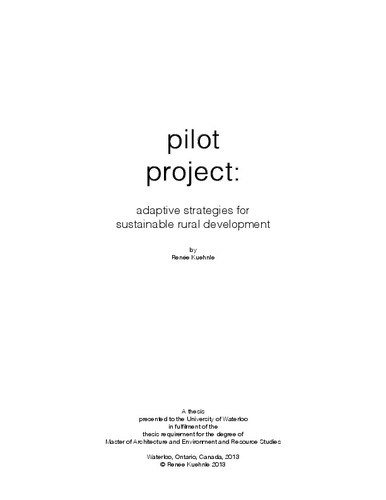| dc.description.abstract | The outport is in the midst of great change. Twenty years since the moratorium on cod fishing, the province of Newfoundland and Labrador is experiencing rapid economic development in another industrial resource boom. While some outports are growing, others continue to decline. This development is based on wealth gained through exploitation of non-renewable resources, and as such, is not sustainable. Investing a portion of these short-term gains into the development of sustainable alternates will improve opportunities and resources for future generations. Pilot Project proposes that latent outport phenomena may act as supporting structures for sustainable development. The project suggests methods of identifying and expanding sustainable outport phenomena. This analysis can be distilled into five strategic tools for testing, designing and implementing sustainable rural development.
1. Territorial Networks defines a diverse region, increasing individual community capacity and developing resilience by examining existing micro-regional community connections and designing new ones.
2. Community Stewardship encourages a re-organization of local social structures and informal governance initiatives by defining communication pathways and aligning stakeholder interests.
3. Temporal Alignment co-ordinates the events, services and opportunities over time, between communities, by creating flexible infrastructure for supporting temporary and seasonal outport needs.
4. Informal Economies develops new modes of production by blending traditional trade and barter markets with industrial production frameworks, providing economic sustenance in the outport.
5. Place-making constructs new institutions and landmarks with available resources, reorganizing the rural web of social, economic and ecological activity in the region.
Newfoundland operates at the extremes. On one hand, rural folk culture has established small-scale, informal community structures; on the other, industrial mega-projects develop according to strict legislation, market pricing, and resource extraction. The proposed strategies find new links between these extremes. Tried and true vernacular development methods are paired with newly emerging technologies and ideas about the future. Rural areas in Newfoundland have historically been used as testing grounds for heavy-handed development ideas, often with severely adverse effects on communities. This project proposes a series of micro developments: the mobilization of existing resources with small capital investment, little risk, and immediate opportunities for implementation. Sustainable rural development is conceived as a practice, an aggregative change from within the community. | en |

